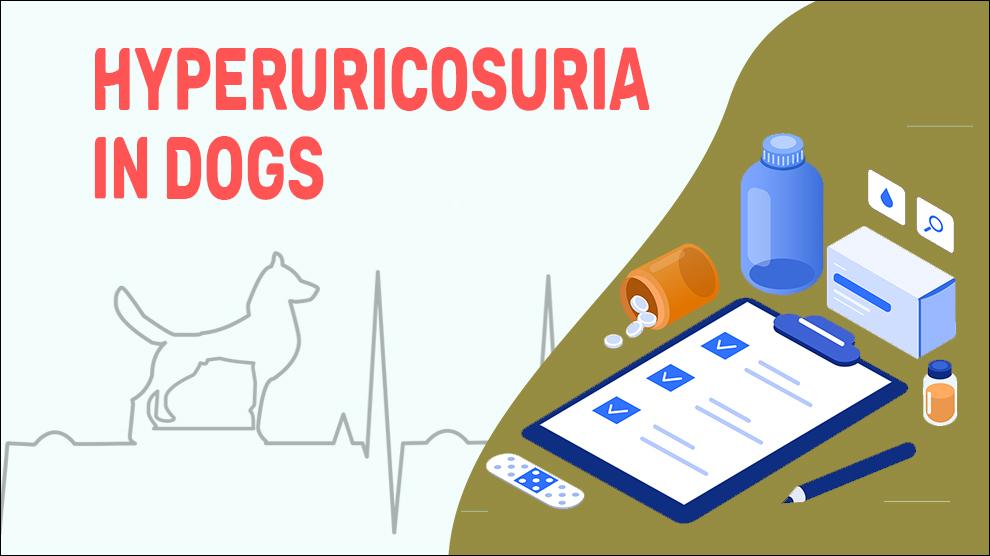Hyperuricosuria (HUU) is an inherited, autosomal recessive disorder that causes excessive excretion of uric acid in the urine, which can result in the formation of stones in the bladder or sometimes kidneys (urate urolithiasis).
Bladder stones can cause various problems for dogs, from incontinence and distress to dangerous blockages of the urinary tract.
As an isolated abnormality, up to 15% of canines with hyperuricosuria have calcium stones and it is also found together with other metabolic irregularities in up to almost half of the calcium stone formers. Contrastingly to dogs with pure calcium oxalate stones, hyperuricosuria dogs typically have normal urinary calcium and oxalate levels but increased urinary uric acid levels. The process by which uric acid promotes calcium stone formation is not clearly elucidated.
The increased dietary purine intake is said to be the most common cause of hyperuricosuria. However, hereditary and acquired diseases may also be accompanied by hyperuricosuria, lymphoproliferative and myeloproliferative disorders, pernicious anemia, hemoglobinopathies, hemolytic disorders, hereditary renal hypouricemia, and secondary polycythemia.
Symptoms Of Hyperuricosuria
Treatment Options For Hyperuricosuria
Overall, there are three main treatment options for bladder stones. The type of stone present advocates the specific treatment that is recommended. Based on your dog's individual circumstances, your veterinarian will discuss the pros and cons of each treatment option.
1) Surgical removal - All or part of the urinary bladder (cystotomy).
2) Non-surgical removal – Uro hydro propulsion (Through distended urethral lumen- special catheter with a saline solution is passed through to expel the stones through the bladder).
3) High level of uric acid stones - Potassium citrate therapy (20 - 40 mEq twice a day).
4) Allopurinol – This restrains the conversion of xanthine and hypoxanthine to uric acid.
Home Remedies For Hyperuricosuria
Encourage your dogs to intake water by keeping water bowls, and water fountains nearby, adding flavor (chicken broth or bone broth) or adding wet food to dog diet.
On a dry food diet, The recommended fluid intake for dogs.
Body weight (1 lb) - 1 ounce of water.
For every consumed calorie - 1 ML of water.
Prevention Of Hyperuricosuria
The best way to reduce your dog's bladder issues lies in preventative care. Your veterinarian may recommend dietary formulas (for dogs having a history of bladder issues) with the right nutritional balance to sustain good overall health.
Keep the dog well-hydrated as this helps to dilute the urine and keep urate stones in check.
Defy the urge to give dog nutritional supplements without your veterinarian's approval.
Affected Breeds Of Hyperuricosuria
Dalmatian, Bulldog, Black Russian Terrier
Additional Facts For Hyperuricosuria
1. Causes:
Genetics- autosomal recessive disorder
2. Mortality
There is no documented mortality rate connected with hyperuricosuria alone but this is fatal if left untreated in other related conditions such as hemolytic disorders where hyperuricosuria is manifested as a symptom.
3. Morbidity:
- These stones contain ammonium acid urate, uric acid, or sodium urate.
- Only 6 - 8 percent of all bladder stones are urate stones.
- Certain breeds are genetically predisposed to form urate stones.
- The urates are common among male dogs and the age of onset is between 1 to 4 years.
- It’s tempting to presume that any stone Dalmatian forms are a urate. (male Dalmatians 97 percent of stones were urate).
4. Diagnosis:
- Inflammatory or infectious disease testing (in certain cases)
- SDMA test: SDMA (a naturally occurring biological indicator for kidney function)
- IRIS (The International Renal Interest Society) staging system - urine protein: creatinine ratio [UPC)
- Urine testing (urinalysis and urine culture)
- Abdominal ultrasound
- Blood work evaluation
5. Prognosis
Many instances of hyperuricosuria can be reversed depending on the cause and with prompt treatment. In some dogs, medical intervention will offer a much-needed healing period for kidneys and in other cases, dogs may get well but develop irreparable damage that is clinically significant leading to chronic kidney diseases.
When To See A Vet
Contact your vet right away, if you notice any of the following:
- Discomfort/difficulty to urinate
- Bloated or sensitive stomach
- Bloody Cloudy or discolored urine
Food Suggestions For Hyperuricosuria
Oxalate stones:
- High oxalate foods such as brown rice, organ meat, beets, nuts, sweet potatoes, and green beans can be avoided.
- Add foods with lower oxalate levels like high-calcium dairy foods, plain cooked chicken/turkey, boiled vegetables, apples (peeled), pasta, vegetables (mustard greens, cabbage, broccoli, cauliflower), bananas, etc.
- Add more water to the food and flavor the water with low sodium beef or chicken broth.
Urate stones:
- Generally, low purine diets can both prevent and dissolve urate stones.
- Foods High in Purines: organ meats like liver, seafood (Mackerel, Herring, Trout, Sardines), and Legumes (such as chickpeas, lentils, and kidney beans).
- Foods Lower in Purines: Muscle meats (beef, chicken, lamb, pork), Eggs and Green leafy vegetables (except spinach), Nuts, yogurt, etc.
Conclusion
Provide a well-balanced diet and ensure your dog always stay hydrated, so they can flush out the bladder consistently. Complete prevention of hyperuricosuria is very hard, but early identification may allow your veterinarian to regulate your dog's medications or diet before your dog requires surgery.

















